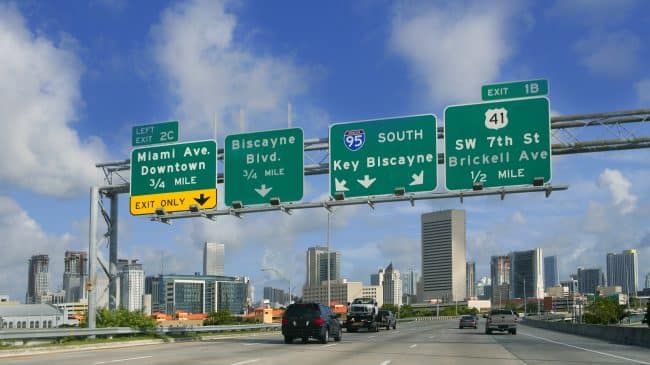With strong support from the business community, the Florida Legislature this year approved three new north-south toll roads, totaling over 300 miles. The toll roads, called Multi-use Corridors of Regional Economic Significance (M-CORES), would relieve congestion on I-75, permit economic development to accommodate forecast population growth, and add new hurricane evacuation routes. But anti-toll actions by the Legislature threaten Florida’s toll roads and economy.
As one of America’s fastest-growing states, Florida has managed to keep pace with exuberant population growth by using toll revenues to finance over 3,500 lane-miles of toll roads, starting with Florida’s Turnpike in 1957. Today, 33 counties, including Brevard, Lake, Orange, Osceola, and Seminole, have tolled lanes, and motorists travel 16 billion miles on them each year. Charging directly for these roads ensures millions of annual tourists pay for the roads they use and miles they drive. And nearly all the toll revenue is reinvested in the counties where the toll roads are located.
Unfortunately, new toll roads like the three M-CORES projects, as well as planned widening of the Turnpike, new projects like the Kendall Parkway in Miami-Dade County, Central Florida Expressway Authority projects like extending Poinciana Parkway and Turnpike projects like the Colonial Parkway are all under threat from anti-toll legislation.
These anti-toll efforts started with a populist backlash against the Miami-Dade Expressway Authority (MDX). When it converted to all-electronic toll collection a few years ago, MDX began charging for all the miles driven on its five toll roads, which meant that about half its regular users had to start paying tolls. And that created an uproar.
In 2017, legislators responded by passing a measure regulating express toll lanes. If those lanes get congested during peak rush hours, tolls must be decreased to 50 cents/mile instead of being raised enough to keep cars moving at the speed limit. This “poison pill” undercuts the purpose of the lanes and guarantees gridlock during peak periods. For now, the law affects only the I-95 Express Lanes in Miami, but it puts the emerging express lanes in Orlando on I-4 and others in Jacksonville, Miami, and Tampa in jeopardy.
This year, the legislature added another anti-toll measure: to abolish MDX, replacing it with an agency controlled by the state rather than local officials, and restricting its ability to increase tolls and to issue new revenue bonds. It has been ruled unconstitutional as a violation of Miami-Dade’s home-rule charter, but the ruling is being appealed.
So how does this impact Orlando? Nearly all toll road projects, like Turnpike widening and the Poinciana Parkway in metro Orlando, are financed by issuing long-term toll revenue bonds. Bond-rating agencies advise bond buyers about the riskiness of each bond issue. The higher the risk, the higher the interest rate will be. Higher interest rates mean the annual cost of paying the debt is higher, which means toll rates will be higher than we are used to in Florida. And in some cases, the higher debt service could lead to decisions that projects aren’t feasible and cannot be built.
Bond-rating agencies are very concerned about these political interventions into Florida tolling. Before Gov. DeSantis signed the bill to kill MDX, Municipal Market Analytics wrote: “Outstanding MDX bonds have already been downgraded … At least with respect to tolls, Florida is demonstrating a growing problem with willingness to pay: a long-term concern for all holders of state and local toll revenue bonds in the state.”
While most legislators considered these anti-toll measures as “local issues” of concern only in Miami, bond buyers view them as a sign of risk — making it a statewide problem. Not counting the planned M-CORES toll roads, Florida already has $10 billion in planned toll projects in the pipeline, including several in Orlando. These projects are now in peril unless the state’s recent anti-toll policies are reversed.
Our state’s highway capacity has kept pace with population growth thanks to both fuel tax revenue and toll revenue. But, like many other states, Florida is beginning to see a leveling off in gas tax revenue. All serious projections show federal and state fuel tax revenues declining over the next several decades so toll projects are going to be key to accommodating growth and maintaining mobility across the state. The legislature’s anti-toll actions seriously threaten highway financing, which risks destabilizing Florida’s economy.
This column originally appeared in the Orlando Sentinel.

